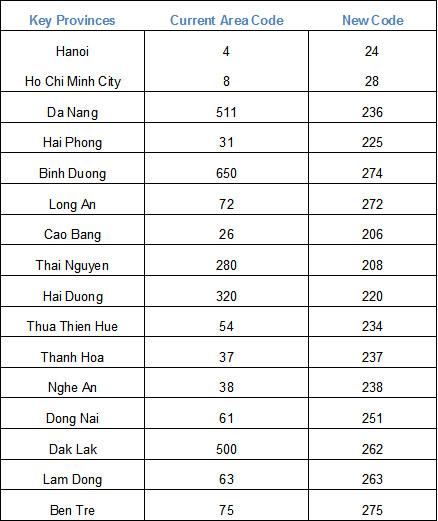Businesses in Vietnam Must Prepare for March 1st Change in Phone Area Codes
HANOI – On March 1, Vietnam will begin switching the area codes and prefixes of phones throughout the country, both landlines and mobile phones will see their numbers changed. The new area codes will be applied to 59 out of Vietnam’s 63 provinces, excluding the provinces of Ha Giang, Vinh Phuc, Phu Tho and Hoa Binh.
Vietnam’s Ministry of Information and Communications (MIC) is in charge of the changeover and will be following the guidelines laid out in Circular No. 22/2014/TT-BTTTT, issued on December 22, 2014. All new numbers will go into effect on March 1st; however, the old numbers will remain in operation for the next two years in order to provide time for businesses to make the switch over. Therefore, phone users will have time to get used to the new numbers.
 RELATED: Dezan Shira & Associates’ Business Advisory Services
RELATED: Dezan Shira & Associates’ Business Advisory Services
The current area codes across the country range from one to three digits. The one-digit area codes are used in the country’s capital, Hanoi, and Ho Chi Minh City (HCMC). The two-digit area codes are used in 37 provinces, and three-digit ones are used in the remaining 24 provinces. Starting from March of this year, the area codes in the capital and HCMC will be two-digits, 24 and 28 respectively. The other 61 provinces will use three-digit codes.
Additionally, three-digit mobile phone prefixes will be changed into two-digit ones. Thus, the new Circular will lead to a switch from 11-digit mobile numbers to ten-digit mobile numbers being used nationwide. This will affect approximately half of the nation’s mobile subscribers since they are using phones with 11-digit numbers.
RELATED: Vietnam to Launch National Foreign Investment Information System
Many businesses have complained of the seemingly sudden change to the area codes. These businesses will now be forced to update all of their work materials with their new contact information. The spending on such items as billboards, websites, name cards, leaflets and other marketing materials could have a sizeable short-term impact on Vietnam’s economy – a fact that has no doubt not escaped government officials.
In explanation of the changes, the government has stated that the current Vietnamese phone system is no longer able to handle the country’s fast expanding telecommunications network. Additionally, the new area codes will standardize the length of phone numbers throughout the country, thus reducing confusion and situations of misdialing.
The MIC has announced that it will ensure that all affected users will receive notification via media and other types of communication 60 days before the changes are implemented. Also, in order to ensure a smooth change-over process, the MIC will be working closely with telecommunications companies and will provide any needed technical support.
In 2014, according to recent statistics from the MIC, there were a total of 130 million phone subscribers, seven million landline subscribers (5.4 percent) and 120 million mobile subscribers (94.6 percent). There has been a steady shift over the previous years away from landlines to mobile phones. Landline phones are now primarily used by businesses and other organizations, rather than households.
Vietnam’s country code will remain the same at +84. Please see below for some of the key areas which will have their area codes changed:
|
Asia Briefing Ltd. is a subsidiary of Dezan Shira & Associates. Dezan Shira is a specialist foreign direct investment practice, providing corporate establishment, business advisory, tax advisory and compliance, accounting, payroll, due diligence and financial review services to multinationals investing in China, Hong Kong, India, Vietnam, Singapore and the rest of ASEAN. For further information, please email vietnam@dezshira.com or visit www.dezshira.com. Stay up to date with the latest business and investment trends in Asia by subscribing to our complimentary update service featuring news, commentary and regulatory insight. |
Import and Export: A Guide to Trade in Vietnam
In this issue of Vietnam Briefing Magazine, we provide you with a clear understanding of the current business trends related to trade in Vietnam, as well as explaining how to set up your trading business in the country. We also attempt to give perspective on what will be Vietnam’s place in the Association of Southeast Asian Nations (ASEAN) in 2015, and look at some of the country’s key import and export regulations.
 Tax, Accounting, and Audit in Vietnam 2014-2015
Tax, Accounting, and Audit in Vietnam 2014-2015
The first edition of Tax, Accounting, and Audit in Vietnam, published in 2014, offers a comprehensive overview of the major taxes foreign investors are likely to encounter when establishing or operating a business in Vietnam, as well as other tax-relevant obligations. This concise, detailed, yet pragmatic guide is ideal for CFOs, compliance officers and heads of accounting who need to be able to navigate the complex tax and accounting landscape in Vietnam in order to effectively manage and strategically plan their Vietnam operations.
 An Introduction to Doing Business in Vietnam 2014 (Second Edition)
An Introduction to Doing Business in Vietnam 2014 (Second Edition)
An Introduction to Doing Business in Vietnam 2014 (Second Edition) provides readers with an overview of the fundamentals of investing and conducting business in Vietnam. Compiled by Dezan Shira & Associates, a specialist foreign direct investment practice, this guide explains the basics of company establishment, annual compliance, taxation, human resources, payroll, and social insurance in the country.
- Previous Article Neue Investitionsmöglichkeiten in Vietnam: Long Hau
- Next Article Vietnam’s Growing Tech Capabilities Attract Foreign Investment


































